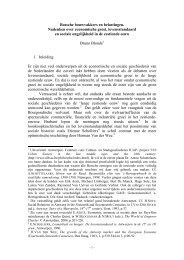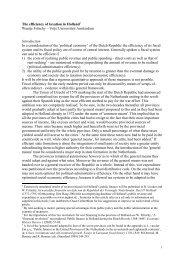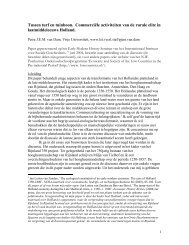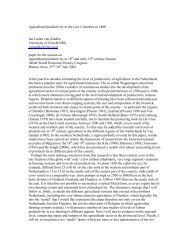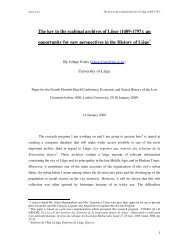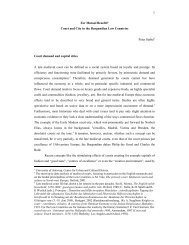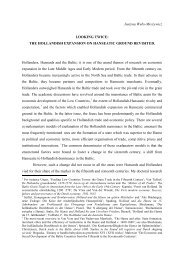Amsterdam as the cradle of modern futures and options trading ...
Amsterdam as the cradle of modern futures and options trading ...
Amsterdam as the cradle of modern futures and options trading ...
Create successful ePaper yourself
Turn your PDF publications into a flip-book with our unique Google optimized e-Paper software.
w<strong>as</strong> completed <strong>and</strong> written up in <strong>the</strong> business ledgers, merchants simply tore up <strong>the</strong> original<br />
contracts. The few contracts that have p<strong>as</strong>sed down to our times relate without exception to<br />
transactions that were not, or not properly completed.<br />
One such event w<strong>as</strong> <strong>the</strong> untimely death <strong>of</strong> Hans Thijs, an <strong>Amsterdam</strong> merchant who<br />
w<strong>as</strong> killed in a shipping accident in September 1611. His business papers <strong>and</strong> <strong>the</strong> ledgers <strong>of</strong><br />
<strong>the</strong> VOC show this merchant bought <strong>and</strong> sold more than twenty shares in various chambers <strong>of</strong><br />
<strong>the</strong> company without ever p<strong>as</strong>sing before a notary. 81 Among <strong>the</strong> unsettled contracts in his<br />
estate are a h<strong>and</strong>written forward, signed only weeks before his death, <strong>and</strong> a h<strong>and</strong>written future<br />
from December 1610, stipulating <strong>the</strong> transfer to a third party <strong>of</strong> a forward contract negotiated<br />
<strong>the</strong> year before. 82 These documents make it clear that <strong>the</strong> emergence <strong>of</strong> nei<strong>the</strong>r forwards nor<br />
<strong>futures</strong> hinged on <strong>the</strong> availability <strong>of</strong> st<strong>and</strong>ardized, printed contracts. 83 To certify <strong>the</strong><br />
transaction it sufficed that “... two duplicate contracts were made, cut in half through ABCD<br />
<strong>and</strong> signed by both parties respectively.” 84<br />
The first reference to printed contracts is found in a notarial deed written after <strong>the</strong><br />
failure <strong>of</strong> <strong>Amsterdam</strong>’s first bear syndicate in <strong>the</strong> spring <strong>of</strong> 1610. The bankruptcy <strong>of</strong> <strong>the</strong><br />
bookkeeper <strong>and</strong> various members <strong>of</strong> <strong>the</strong> syndicate led to a host <strong>of</strong> declarations regarding<br />
contracts that had not been fulfilled. Most <strong>of</strong> <strong>the</strong>se deeds refer to notarized or private contracts<br />
but in one attestation a merchant from Dordrecht mentioned “forty pieces <strong>of</strong> printed contracts<br />
for shares”. Perhaps to save <strong>the</strong> trouble <strong>of</strong> traveling to <strong>Amsterdam</strong>, he had left <strong>the</strong>m in <strong>the</strong><br />
h<strong>and</strong>s <strong>of</strong> <strong>the</strong> syndicate’s bookkeeper in 1609. 85 For a time, private h<strong>and</strong>written <strong>and</strong> notarized<br />
contracts appear to have circulated alongside each o<strong>the</strong>r, but printed forms presumably<br />
predominated by 1620. 86 Thus <strong>the</strong> survival <strong>of</strong> what today are <strong>the</strong> world’s oldest printed<br />
forward contracts w<strong>as</strong> a matter <strong>of</strong> chance. 87 In 1635, <strong>the</strong> heirs <strong>of</strong> a merchant who had written<br />
two forwards in 1629 appeared before a notary to try <strong>and</strong> force <strong>the</strong> reluctant o<strong>the</strong>r party, a<br />
merchant who in <strong>the</strong> meantime had moved to Ma<strong>as</strong>tricht, to accept a settlement. As pro<strong>of</strong> <strong>of</strong><br />
<strong>the</strong> transaction, <strong>the</strong> two printed forms were attached to <strong>the</strong> notarial deed.<br />
Besides written pro<strong>of</strong> <strong>of</strong> <strong>the</strong>ir transactions, traders had to make arrangements for <strong>the</strong><br />
payment <strong>of</strong> <strong>the</strong>ir contracts. 88 The dearth <strong>of</strong> c<strong>as</strong>h <strong>and</strong> <strong>the</strong> h<strong>as</strong>sle <strong>of</strong> repeated bank transfers put a<br />
premium on devices to cancel out transactions against each o<strong>the</strong>r. At first, individual<br />
merchants privately arranged <strong>the</strong> settlement <strong>of</strong> mutual claims. 89 Sometimes groups <strong>of</strong><br />
merchants organized clearing toge<strong>the</strong>r. For example, shortly before Lemaire’s bear syndicate<br />
w<strong>as</strong> dissolved in 1610, <strong>the</strong> members agreed to stop buying <strong>and</strong> selling <strong>and</strong> ‘merely settle <strong>the</strong><br />
lots to be delivered with <strong>the</strong> lots to be received.’ 90 Such private arrangements <strong>of</strong> course only<br />
covered <strong>the</strong> transactions <strong>of</strong> a specific group, not <strong>of</strong> <strong>the</strong> market <strong>as</strong> a whole.<br />
12



